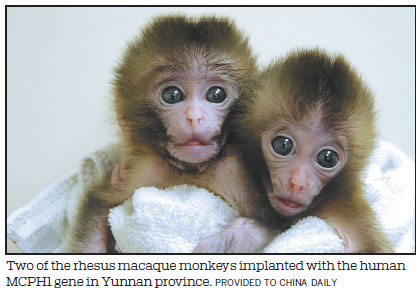Primate genetic research approved
Experiments conducted by Chinese scientists to test brain development of monkeys carrying human gene copies have received ethical approval, and the scientific work complies with international animal welfare standards, according to a Chinese research institute.
The study involves 11 rhesus macaque monkeys carrying copies of the human MCPH1 gene introduced into the monkeys in the embryonic phase. Scientists believe the gene is crucial for human brain development and evolution.
The project began in 2010 and was led by researchers from the Kunming Institute of Zoology, under the Chinese Academy of Sciences, who collaborated with researchers from the University of North Carolina.
The monkeys carrying human genes performed better on short-term memory tests and also have faster reaction times compared with the control group, according to the findings published on March 27 in the China-based journal National Science Review.
The paper said the research is beneficial to understanding the origin and evolution of mankind's central nervous system and will help develop treatments for brain abnormalities such as autism.
Su Bing, a geneticist at the institute and one of the lead scientists in the study, said that of the 11 transgenic monkeys, five were designed to survive only into the fetal stage in order to study their in utero brain development patterns.
Of the six monkeys born, one died two months after birth for unknown reasons, and the rest have remained healthy, Su told China Daily on Wednesday, adding that they did not find evidence that the gene implant caused the death.
Due to the limited sample size, he said they will need to create more transgenic monkeys and apply new research tools and analytical methods to better understand the effect of the MCPH1 gene on brain development and cognition.
However, the experiment has divided the scientific community, with some scientists criticizing it as unethical. Some even speculated that it could lead to a Planet of the Apes-type scenario in which humanity clashes with genetically enhanced intelligent primates.
"It is necessary for scientists to care about animal welfare and ethics, but speculation is often irresponsible and untrue," he said. "While monkeys and humans have similar genomes, there are still tens of millions of genetic differences. Changing one gene carefully designed for research will not result in drastic change."
Though arguments can be made against genetically modifying apes, which are more genetically similar to humans than monkeys, "scientists agree that monkey models are at times irreplaceable for basic research, especially in studying human physiology, cognition and disease", Su said.
In 2008, US scientists created transgenic macaque monkeys carrying the human Huntington's disease gene to understand the condition and possibly identify a new form of treatment for this incurable genetic disorder.
In 2009, Japanese scientists created the world's first transgenic marmosets, a small monkey native to Brazil, that used a gene to make the animals' skin glow a fluorescent green. Scientists said the research could open new prospects for medical research.
"China has also made great strides in life science related to nonhuman primates ... thanks to strong government support and effective use of its monkey breeding and research facilities," Su said.
The institute told China Daily that the ethical justification for Su's experiments received approval in 2010. The institute has also earned accreditation from the Association for Assessment and Accreditation of Laboratory Animal Care, an international nonprofit organization that promotes the humane treatment of animals in science.
In 2015, the animal ethics committee of Kunming Biomed International, a research organization specializing in nonhuman primates, also declared that the animals were being treated humanely in every step of the experiments, and in accordance with domestic and international regulations, the statement said.
In 2017, the institute's bioethics review committee again evaluated and approved the experiments before applying for funds from the National Natural Science Foundation of China, with the project gaining the foundation's support.
zhangzhihao@chinadaily.com.cn

(China Daily 04/18/2019 page3)


















